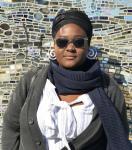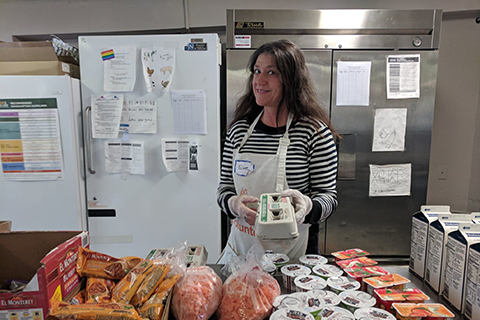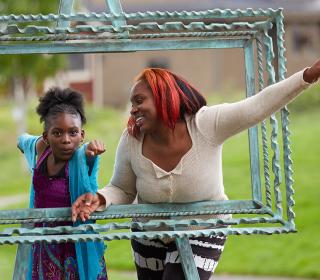WHAT IS YWCA'S CENTRAL AREA FOOD BANK?
Established in 1947, YWCA East Cherry is home to YWCA's Central Area Food Bank run by YWCA’s King County Resource Coordinator, Nichelle Hilton. The food bank is an essential resource to the community, distributing over 2,500 pounds of food a week for free. The food bank meets a vital need for many low-income families that struggle to meet all of their financial obligations and provide food for their families.
The food bank is set up in a grocery style layout to ensure clients have the dignity of choice. Participants bring their own bags and fill up as they browse around with the assistance of our friendly volunteers. Selections from the food bank include meat, dairy products, canned and boxed food, juice, water, paper, and hygiene products.
Childhood Hunger Helper is one program from the food bank to help the hunger gaps children may experience over the weekend (when they aren’t receiving meals through their school). Meal packs are made and delivered to students in need. YWCA’s Central Area Food Bank mission is to provide good quality food for anyone in need.

ACCESSING THE FOOD BANK
YWCA’s Central Area Food Bank is located behind the administrative offices at YWCA East Cherry. There are no qualifications to receive food however, YWCA clients receive first priority. From 12 to 3 p.m. every Wednesday, the food bank distributes food in the following time sets:
- YWCA emergency shelter residents: Noon – 1 p.m.
- YWCA program participants: 1 – 2 p.m.
- General public: 2 – 3 p.m.

FUN FACT
YWCA’s Central Area Food Bank works to eliminate hunger and improve health in the Central District by offering fresh produce on the day it’s delivered. Fresh produce is an all-time favorite among clients and the community. Much of the produce the food bank offers is donated by local farmer’s markets.
Another portion of produce is generated from the food bank itself through a garden created in 2014 as an Earth Day project. Judith and Maureen are the two dedicated volunteers who currently maintain the garden. Some of the plants in the garden this year include thyme, oregano, rosemary, strawberries, and blueberries, as well as black-eyed Susan's, Clematis, and other perennial flowers.

A MOMENT WITH NICHELLE
Each Wednesday, Nichelle Hilton can be found at YWCA East Cherry wearing the hat of Food Bank Boss. Nichelle gave me a few minutes to show me around East Cherry and answer a couple of questions.
Why is fighting hunger important to you?
Hunger is such a basic need, so many of us take for granted. To know a neighbor, a person sharing the same community with us is struggling to meet that basic hunger – we need to do what we can to help.
Who has helped you the most to fight hunger?
Northwest Harvest and Food Lifeline for trainings and support, and the Seattle Food Committee.
What is the most challenging part of your role?
The budget restraints, there is no purchasing power.
What is the most rewarding part of your role?
The clients’ satisfaction of our great food!
Do you have any other comments you want to make about the food bank?
We are always in need of volunteers, food, and awareness.

SUPPORT THE FOOD BANK
Central Area Food Bank would like to invite bilingual volunteers to help on distribution day. It would be a big help to have volunteers who speak Mandarin, Cantonese, Tagalog, Vietnamese, and other languages to help us welcome community members. Contact volunteer@ywcaworks.org to get started!
We could not help as many people as we do through our food bank without the support of volunteers and donors. Make it your mission to help us stop hunger in Seattle by giving to YWCA or stopping by the food bank Wednesday mornings from 9 a.m. to 12 p.m. to make in-kind donations.
Top Needs in 2018:
Meat
- Frozen meat
- Fresh Meat
- Sandwich meat
- Canned meats
- Dried meats
- Meaty soups and stews
Dairy
- Milk (liquid, powdered, rice, and/or nut milks)
- Yogurt
Paper Products
- Paper plates
- Paper bowls
- Paper cups
- Disposable utensils
- Napkins
Hygiene Products
- Feminine hygiene products
- Diapers
- Toothpaste and toothbrushes
- Dental floss
- Deodorant
- Bar soap
- Shampoo and conditioner

Kendyl Hardy is the Volunteer Services Coordinator at YWCA Seattle | King | Snohomish. As an avid volunteer herself, Kendyl finds volunteering is a way to grow personally and as a community. Kendyl graduated with a degree in Public Relations with a concentration in nonprofit management. Throughout her college career, she worked to highlight the importance of civic service to sustain society and feature dialogue about issues affecting our communities.
We share the stories of our program participants, programs, and staff, as well as news about the agency and what’s happening in our King and Snohomish community.


